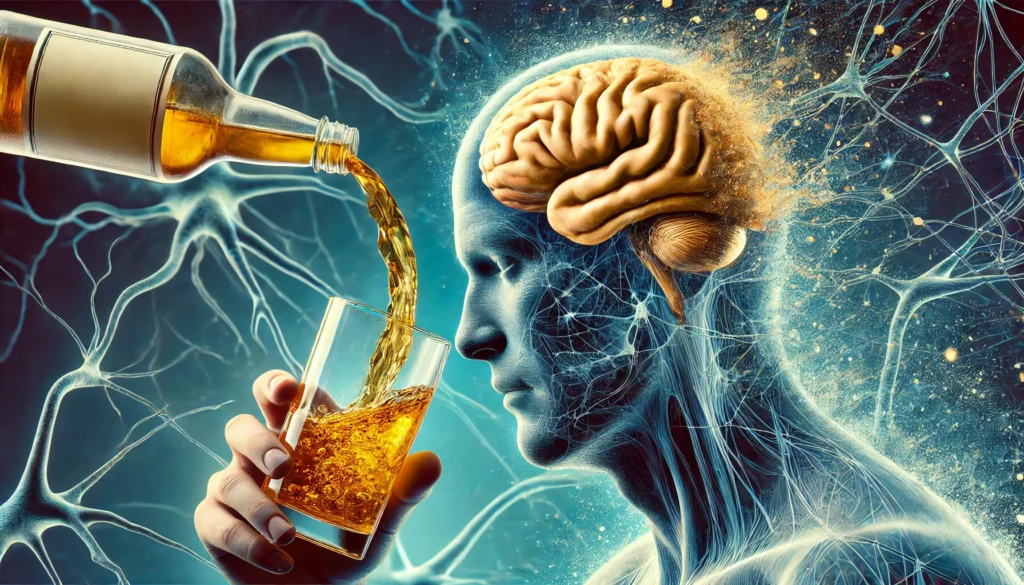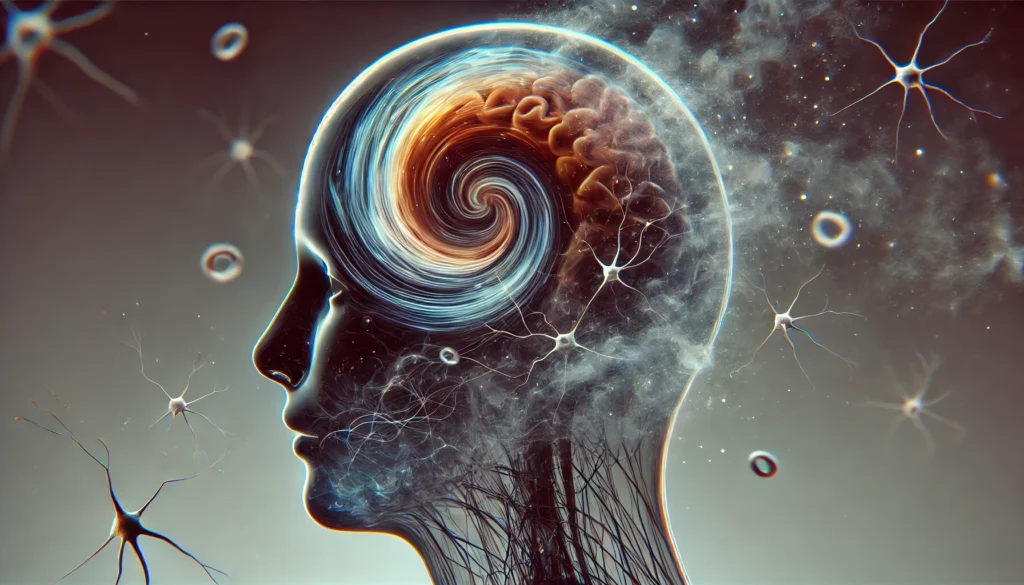Alcohol consumption affects the brain in various ways, depending on the amount and duration of use. Understanding these effects is vital for assessing the potential risks associated with drinking.
You may also like: Understanding the Science Behind Lost Memory
How Does Alcohol Affect the Brain?
Alcohol is a central nervous system depressant that can have both short-term and long-term effects on the brain. In small amounts, alcohol can induce feelings of relaxation and sociability. This is due to its impact on neurotransmitter activity, including increased dopamine release, which can enhance mood temporarily. However, chronic and heavy drinking can lead to structural and functional changes in the brain. Long-term exposure to alcohol can result in the shrinkage of brain tissue and alterations in neurochemistry. The hippocampus, which is involved in memory formation, is particularly vulnerable to alcohol damage, potentially leading to cognitive impairments. Repeated episodes of binge drinking can cause acute damage to the brain, leading to blackouts and impaired memory recall.
The Role of Neurotransmitters
Alcohol affects various neurotransmitter systems, notably gamma-aminobutyric acid (GABA) and glutamate. It enhances GABA’s inhibitory effects, which can lead to sedation and impaired motor functions. Concurrently, alcohol inhibits glutamate, a neurotransmitter responsible for excitatory signaling, which can contribute to cognitive and memory deficits. Over time, these disruptions can alter brain chemistry permanently, affecting cognitive functions.
Alcohol’s Impact on Brain Plasticity
Brain plasticity refers to the brain’s ability to adapt and reorganize itself. Alcohol consumption, particularly in excessive amounts, can impair this adaptability. This can lead to difficulties in learning new information and skills. Chronic alcohol consumption can reduce the brain’s capacity to form new neural connections, essential for memory and cognitive flexibility.
Does Drinking Cause Dementia?
The question of whether drinking causes dementia is complex. Several factors contribute to this complexity, including the amount of alcohol consumed, individual health conditions, and genetic predispositions.
The Link Between Alcohol and Alzheimer’s Disease
Research indicates that excessive alcohol consumption is a significant risk factor for various forms of dementia, including Alzheimer’s disease. Alcohol can exacerbate the accumulation of amyloid-beta plaques, a hallmark of Alzheimer’s. Additionally, alcohol-induced inflammation and oxidative stress can accelerate neurodegenerative processes associated with Alzheimer’s disease.
Alcohol and Frontotemporal Dementia (FTD)
Frontotemporal dementia (FTD) is another form of dementia that can be influenced by alcohol consumption. Studies suggest that alcohol can accelerate brain aging and exacerbate other risk factors like hypertension and liver disease. The frontal and temporal lobes, which are critical for personality and behavior, are particularly affected in FTD, and alcohol can further impair their function.
How Alcohol Accelerates Brain Aging
Alcohol consumption can lead to premature aging of the brain. This is due to its impact on telomeres, the protective caps on the ends of chromosomes. Shortened telomeres are associated with cellular aging, and heavy drinking can accelerate this process. This premature aging can increase susceptibility to various forms of dementia.
Alcohol-Related Dementia: An Overview
Alcohol-related dementia (ARD) is a specific condition that arises from prolonged alcohol abuse. Understanding its characteristics and causes is essential for diagnosis and treatment.
What is Alcohol-Related Dementia (ARD)?
Alcohol-related dementia (ARD) is a type of dementia directly associated with prolonged alcohol abuse. It encompasses a range of cognitive impairments, from memory loss to difficulties in reasoning and judgment. The symptoms of ARD can overlap with other forms of dementia, such as Alzheimer’s, making diagnosis challenging. ARD is often underdiagnosed, as symptoms can overlap with other forms of dementia and cognitive disorders. Misdiagnosis can lead to inappropriate treatment strategies, highlighting the need for thorough assessment.

The Role of Thiamine Deficiency
Thiamine (vitamin B1) deficiency is a common consequence of chronic alcohol abuse and is crucial for brain function. A severe lack of thiamine can result in Wernicke-Korsakoff syndrome, a serious neurological disorder that can progress to ARD if left untreated. Thiamine is essential for glucose metabolism in the brain, and its deficiency can lead to neuronal damage and cognitive decline.
Identifying Symptoms of ARD
Recognizing the symptoms of ARD is critical for early intervention. Common symptoms include memory loss, confusion, and difficulty with coordination. As the condition progresses, individuals may experience changes in behavior and personality, such as increased irritability or apathy. Early diagnosis and treatment can prevent further cognitive decline.
Is Alcoholic Dementia Reversible?
Reversibility of alcohol-related dementia depends on several factors, including the duration and severity of alcohol abuse. Exploring potential recovery paths can offer hope for affected individuals.
Can Alcohol-Related Dementia Be Reversed?
One of the pressing questions is whether alcohol-related dementia can be reversed. While some cognitive functions may improve with sustained abstinence and nutritional supplementation, particularly thiamine, the extent of recovery can vary. Early intervention, including medical treatment and lifestyle changes, is key to mitigating the effects of ARD. Abstinence from alcohol is crucial, as continued drinking can exacerbate cognitive decline.
The Role of Nutritional Support
Nutritional support plays a vital role in the potential reversibility of ARD. Supplementation with vitamins, particularly thiamine, can help address deficiencies caused by alcohol abuse. A balanced diet rich in essential nutrients supports brain health and can aid in cognitive recovery. Healthcare providers may recommend specific dietary changes to optimize nutrient intake.
Cognitive Rehabilitation Strategies
Cognitive rehabilitation can enhance recovery from ARD by improving cognitive function and quality of life. This may involve exercises to strengthen memory, attention, and problem-solving skills. Support from healthcare providers, such as occupational therapists, can be instrumental in developing personalized rehabilitation plans. Engaging in cognitive activities, like puzzles and memory games, can also support recovery.
The Broader Implications of Drinking and Dementia
Understanding the link between alcohol and dementia has far-reaching implications for individuals and society. It highlights the need for awareness and preventive measures.
Does Alcohol Make Dementia Worse?
For individuals already diagnosed with dementia, alcohol can exacerbate symptoms and accelerate disease progression. Alcohol’s neurotoxic effects can compound existing cognitive deficits, leading to quicker declines in brain health. It can also interfere with medications used to manage dementia symptoms, further complicating treatment.
Alcohol Consumption and Dementia: A Public Health Perspective
The link between alcohol consumption and dementia has significant public health implications. As both alcohol use and dementia cases continue to rise, understanding their connection can inform prevention strategies and policy decisions. Public health campaigns emphasizing moderation and awareness can help mitigate risks associated with excessive drinking. Education on the effects of alcohol on brain health is crucial for promoting informed choices.

The Role of Healthcare Providers
Healthcare providers play a critical role in addressing the link between alcohol and dementia. They can offer guidance on safe drinking practices and identify individuals at risk for alcohol-related cognitive decline. Regular screening for alcohol use and cognitive assessments can aid in early detection and intervention. Providers can also advocate for policies that support healthy drinking habits.
Future Directions in Research
Ongoing research is essential for deepening our understanding of the relationship between alcohol and dementia. Advances in technology and science hold promise for new insights.
What Does the Future Hold?
Ongoing research aims to unravel the nuances of how alcohol influences brain health and dementia risk. Advances in neuroimaging and molecular biology hold promise for identifying biomarkers of early-stage cognitive impairment related to alcohol use. These biomarkers could enable earlier diagnosis and more targeted interventions. Furthermore, exploring the interplay between genetic predispositions and environmental factors could yield insights into personalized prevention strategies.
The Role of Genetics in Alcohol-Related Dementia
Genetic research may uncover predispositions that increase susceptibility to alcohol-related dementia. Understanding genetic factors could help identify individuals at higher risk and inform personalized treatment plans. Epigenetic studies may reveal how lifestyle factors, like alcohol consumption, interact with genetic predispositions to influence dementia risk.
Innovations in Treatment and Prevention
Innovations in treatment and prevention strategies are on the horizon. New pharmacological interventions targeting the neurochemical effects of alcohol may offer hope for mitigating its impact on brain health. Additionally, public health initiatives focusing on education and awareness can promote healthier drinking behaviors. Collaborative efforts between researchers, healthcare providers, and policymakers are essential for advancing these innovations.
Practical Advice for Minimizing Risks
Taking proactive steps to minimize the risks associated with alcohol consumption can protect brain health. Practical strategies can empower individuals to make informed choices.
Balancing Alcohol Use and Brain Health
For those who choose to consume alcohol, moderation is key. Staying within recommended guidelines and being mindful of drinking patterns can reduce the risk of alcohol-related cognitive decline. Monitoring alcohol intake and setting personal limits can help maintain control over drinking habits. Additionally, maintaining a balanced diet, staying physically active, and engaging in cognitive exercises are beneficial for overall brain health. These lifestyle choices support brain resilience and cognitive function.
Seeking Help and Support
Individuals struggling with alcohol use should seek support from healthcare professionals. Early intervention can prevent the progression of alcohol-related cognitive impairments and improve long-term outcomes. Support groups and counseling services can provide additional assistance for those seeking to reduce or abstain from alcohol. Family and friends can also play a supportive role in encouraging healthier drinking habits.
Strategies for Reducing Alcohol Intake
Reducing alcohol intake can involve various strategies, such as setting specific goals and tracking progress. Substituting alcoholic beverages with non-alcoholic alternatives can help reduce consumption. Practicing mindful drinking by savoring each drink and avoiding triggers can promote healthier habits. Seeking professional guidance for developing personalized reduction plans can increase success in achieving alcohol-related goals.

Conclusion
Understanding the link between alcoholism and dementia is crucial for making informed health choices. While moderate alcohol consumption may not pose significant risks, heavy and chronic drinking is a clear threat to cognitive health. By staying informed and proactive, individuals can safeguard their brain health and reduce the risk of alcohol-related dementia. Emphasizing moderation, seeking support, and adopting healthy lifestyle practices can contribute to long-term cognitive well-being.
Further Reading:
Alcohol Use Disorder and Dementia: A Review
Assessing Alcohol Abuse and Alcohol-Related Dementia
Moderate Alcohol Use May Accelerate Alzheimer’s Disease
Important Note: The information contained in this article is for general informational purposes only, and should not be construed as health or medical advice, nor is it intended to diagnose, prevent, treat, or cure any disease or health condition. Before embarking on any diet, fitness regimen, or program of nutritional supplementation, it is advisable to consult your healthcare professional in order to determine its safety and probable efficacy in terms of your individual state of health.
Regarding Nutritional Supplements Or Other Non-Prescription Health Products: If any nutritional supplements or other non-prescription health products are mentioned in the foregoing article, any claims or statements made about them have not been evaluated by the U.S. Food and Drug Administration, and such nutritional supplements or other health products are not intended to diagnose, treat, cure, or prevent any disease.


